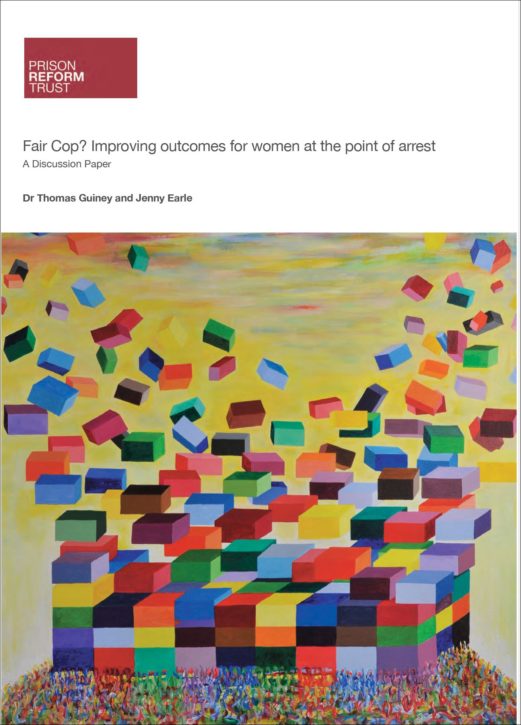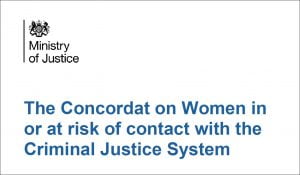Risks drawing vulnerable women into justice system
A new (17 March 2017) report by the Prison Reform Trust reveals significant variations in how police forces deal with women who come into the criminal justice system. Fair Cop? Improving outcomes for women at the point of arrest provides solutions and examples of positive work being delivered by police to tackle low level, non-violent crime committed by women. However, the report also found that opportunities are being missed to intervene early, reduce women’s offending and protect the public.
Massive local variations
A separate analysis of arrest figures shows that whilst the majority of police forces in England and Wales have seen some decline in the number of women arrested in the last year, in nearly two-fifths (37%) of police forces arrests of women rose. The largest increase was seen in Lancashire, where arrests rose by 46% between 2014/15-2015/16. Similar rises were also seen in Dorset (45%) and Hertfordshire (40%).
However, impressive reductions seen in other police force areas give hope that similar results are within grasp if dedicated efforts to intervene early, and tackle the problems that drive people into crime are provided.
In the last year the number of arrests of women in areas such as Leicestershire, Greater Manchester, and Avon and Somerset have fallen, dropping by 29%, 24% and 17% respectively.
Problem-solving approaches
This discussion paper builds the case for greater use of ‘problem-solving approaches’ for women at the point of arrest in cases where the harm caused by an offence is low but the needs of the individual may be multiple and/or complex. Women are more likely to be serving a sentence in prison for theft and other non-violent crimes than men. In many of these instances an out of court disposal may be appropriate, however the use of out of court options for women who have committed low-level offences fell by over 45% since 2007.
The term ‘problem-solving’ is used in the report to refer to a range of interventions for women at the point of arrest including police-based triage schemes, integrated offender management, restorative justice and liaison and diversion services. It encompasses
decisions taken by frontline police officers in the community as well as charging decisions and other disposals made in police custody suites.
The paper draws on detailed research and interviews with the police, probation staff, women’s voluntary sector providers and national policy-makers. It reflects upon present outcomes for women in the criminal justice system and considers how a problem-solving
approach can align with recent policy and practice developments in England and Wales.
The report also reviews existing guidance on the use of out of court disposals and considers five case studies which make for fascinating reading:
- Durham Constabulary: Checkpoint (a 4 month period of unofficial supervision as an alternative to prosecution)
- Humberside Police Adult Female Triage Project
- Greater Manchester: A Whole Systems Approach for Women (using women’s centres as hubs)
- Surrey: Transforming Justice (community resoluton with involvement of women’s centre)
- Wales: IOM Cymru Women’s Pathfinder
The paper concludes with a review of promising practice and identifies a number of building blocks that are critical to the successful delivery of problem-solving early interventions for women.
It’s probation (Jim), but not as we know it
All the five approaches featured are worth looking at but I was particularly intrigued by the Durham Checkpoint intervention which seems to me like an unofficial probation order. Indeed, the Probation Inspectorate found that it was reducing local probation caseloads.
This is how it works:
The scheme offers eligible offenders a four month long ‘checkpoint contract’ as an alternative to prosecution. Where individuals are identified as eligible the custody officer or the investigating officer will explain the programme and ask if they wish to take part. Those who decline will be dealt with via a traditional criminal justice route. Eligible individuals are bailed for 28 days and within 24-72 hours of release from custody, will meet with a specialist ‘navigator’.
The specialist navigators, often seconded probation officers, are at the core of the Checkpoint model. It is critical that they are not police officers as experience has shown that many arrestees are suspicious of the offer of help from the police and will not disclose their needs. The navigator will complete an in depth risk / needs assessment with the individual to determine what has contributed to their offending, which is shared with the partner agencies the person is engaging with. From the assessment, the navigator will agree with the subject a ‘contract to engage’ which will have up to 5 conditions, the first two of which are mandatory:
1. offending condition: not to re-offend over the period of the contract
2. victim’s condition: to take part in a restorative approach if asked
3. pathway condition: intervention to address a critical pathway of need
4. pathway condition: intervention to address a secondary critical pathway of need
5. community condition: complete 18-36 hours voluntary work in the community.The navigator will make contact with partner agencies depending on the needs identified and arrange appointments and interventions accordingly. In the event of a breach of the contract, the navigator will liaise with the agencies involved so that a decision can be made whether to invoke a prosecution or not. If the individual successfully completes the program the investigation file is archived and the charges against the individual dropped, logged as no further action. If the individual fails to engage or breaches the terms of the contract (and the decision to prosecute has been made), the file will be submitted to police decision-makers to consider charging options.
Checkpoint is currently being evaluated by Cambridge University Criminology Department.
Recommendations
The report makes 10 recommendations; the first two which I replicate below:
- Each police constabulary in England and Wales should review existing practices for women in contact with the criminal justice system. In particular, they should work with strategic partners to ensure professional services integrate support around individual women, and embed greater use of problem-solving approaches at the point of arrest.
- The police, Police and Crime Commissioners and probation services (CRCs adn NPS) should explore opportunities for greater alignment or pooling of budgets to shift resources from late intervention to early intervention services at the point of arrest.
Conclusion
This is a substantial and significant report which adds to the momentum currently building on the 10th anniversary of the Corston report to overhaul our approach to women offenders at every point in the criminal justice system.








